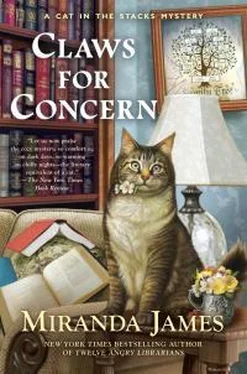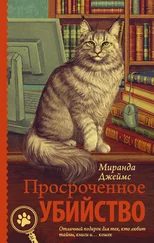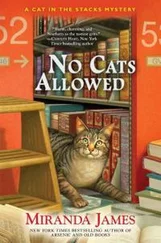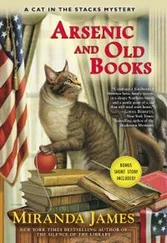“Glad to hear you had a plan.” Haskell flashed a rare smile. “Go on ahead and talk to them, and I’ll talk to my buddy. He’s been there for twenty years, so if there’s anything to know, he’ll know it.”
“One way or another,” Stewart said, “you ought to be able to find out whether this guy is safe to bring into the house.”
“I’ll text him now.” Haskell felt for his phone in the pocket of his gym shorts. He stood. “Left it upstairs. I’ll run and get it.”
When Haskell said run , he meant it. Moments later I heard him running up the stairs to the third floor. Not long after that I could hear him running down again. He arrived back in the kitchen less than two minutes after he’d left it. And, I noted with envy, he wasn’t even breathing hard. I supposed that if I went to the gym as religiously as he and Stewart did, I might be able to run like that.
I might also become emperor of China. Oh, well, I could dream, anyway.
Haskell texted a message right after he resumed his place at the table. Then he laid his phone aside and picked up his coffee cup. Stewart stood and began clearing the table. I still had a few bites of scrambled egg, and I finished them quickly.
By the time Haskell finished his coffee and got up to take the cup to the sink where Stewart was busy rinsing the dishes, his cell phone started ringing.
“It’s Steve, my buddy in Tullahoma,” Haskell said when he looked at the caller ID. He answered the call and greeted his friend.
“Yeah, that’s right,” Haskell said. “Guy named Bill Delaney.” He turned to me. “How old is he?”
“Sixty-six,” I replied.
Haskell relayed the information and then fell silent while his friend talked. His expression changed from intent to grim after a couple of minutes. Finally he thanked his friend and ended the call. He laid the phone aside.
“Something tells me the news isn’t good.” I felt suddenly tense because Haskell’s grim expression hadn’t changed. Diesel, sensing my unease, laid a large paw on my thigh and warbled. I patted his head to calm him while I waited for Haskell’s reply.
“No, it isn’t good,” Haskell said. “Steve says Bill Delaney got away with murder. Multiple murders, in fact.”
TWELVE
For a moment I couldn’t take in what Haskell had said. Then, as the import of his words finally sank in, I collected myself and was able to respond.
“Multiple murders?” I asked. “If he committed multiple murders, why is he not in prison?”
“Exactly,” Stewart said. “Something about that doesn’t add up.”
Haskell nodded. “I know. Thing is, according to Steve, Delaney was never convicted. Never even brought to trial, but Steve reckons Delaney was guilty all right. They just couldn’t prove it.”
“He seems like such a quiet, unassuming man,” I said, still shocked by the revelation.
“That’s no proof against someone being a killer, Charlie,” Haskell said. “You ought to know that by now.”
I nodded. “I do. But, I don’t know, somehow it just doesn’t seem right to think of my uncle’s son as a multiple murderer.”
“They were sure he was the killer,” Stewart said, “but they didn’t have the evidence to bring him to trial, you said.”
“Yes,” Haskell replied. “That happens. Police can be certain who did it, but for whatever reason, there’s no evidence that will stand up in court.”
“Are you at all familiar with the case?” I asked.
“Yes,” Haskell replied. “I remembered it when Steve told me the basic facts.”
“What are they?” Stewart asked.
“Four members of a family were shot to death,” Haskell said. “Parents and two young children. One child, an older girl, survived because she wasn’t home at the time. I think she was spending the night at a friend’s house.”
“How horrible,” I said, my imagination only too easily conjuring up a mental version of the crime scene. “What connection did Bill Delaney have with the family?”
“Father was a farmer. Delaney worked for him,” Haskell said. “They lived out in the county about fifteen miles from Tullahoma.” He frowned. “I think their name was Barber.”
“What motive did he have for killing the family?” Stewart asked.
“He’d had a big blowout with Mr. Barber over something, can’t recall what it was now,” Haskell said. “All this was according to a neighbor. Barber fired Delaney, but he kept coming around. Don’t know why. Maybe he thought Barber owed him money. Then about a week after Delaney got fired, he allegedly went to the house one night and killed four people.”
“They couldn’t prove any of this?” I asked.
“No, Delaney had some sort of alibi. Even though the cops thought it was fishy, they couldn’t break it,” Haskell said. “Trouble was, they couldn’t find anyone else with a strong enough motive.”
“Couldn’t it have been a murder-suicide thing?” Stewart asked. “Surely that’s the obvious answer.”
Haskell frowned. “Of course they thought of that. With any murder you always look at the domestic angle first. Thing was the evidence of the wounds didn’t bear that out. None of them was self-inflicted. So that ruled out murder-suicide.”
“What about the possibility of a stranger?” I asked.
“Delaney kept saying that it was probably a stranger. Claimed to have seen a guy lurking around one of the outbuildings on the farm,” Haskell said. “Apparently Barber was in the habit of keeping a pretty good bit of cash on hand. That was missing. I don’t think it ever turned up.”
“So the case has never been solved,” Stewart said. “I’d hate to have that kind of thing hanging over me.”
Dante yipped twice suddenly, and Stewart picked the dog up and put him in his lap. “What was all that about, you silly dog?”
“Attention,” Haskell said in a tone of irritation. “You’ve been ignoring him, and he hates that.”
Stewart did not respond to that remark. Instead, he said, “Charlie, I think you should get the writer interested in this case. Maybe the two of you together might be able to solve it. You might find out things the police never did.”
I shook my head. “No, I don’t think so.”
“I wouldn’t get involved in it if I were you,” Haskell said. “They might reopen the case, now that they know Delaney is back. He disappeared about a year after the murders, and they hadn’t known where he was until now.”
“What are you going to do about him?” Stewart asked me. “Are you still thinking about letting him live here? Supposing he wants to, that is.”
“I don’t know,” I said. “This really complicates everything. I’m going to have to find out more about the case and the fact that he was, or perhaps still is, a murder suspect. In the meantime, I’m going to see if I can find Delaney at the library today and put off the dinner until tomorrow evening. I was planning to do that anyway so that I’d have time to talk it over with Helen Louise, but now I think it’s even more important to postpone having him here.”
“I agree,” Haskell said. Stewart nodded.
“I also want to see what more I can find out about him, from a source other than the law,” I said, with a quick look at Haskell. He didn’t appear insulted by my statement, so I continued, “I’ll see what my two new contacts from Tullahoma know and go from there.”
“Sounds like a reasonable plan to me,” Stewart said.
Diesel evidently agreed because he meowed twice. Either that, or he—like Dante—was tired of being ignored. I scratched his head until he purred. That done, I said, “If you’ll excuse me now, I’m going to e-mail Jack Pemberton and Miss An’gel.” Seeing both men frown, I added, “For Ernie Carpenter’s phone number, or her e-mail address, whichever Miss An’gel feels comfortable sharing with me. I forgot to ask Ernie herself last weekend.”
Читать дальше












